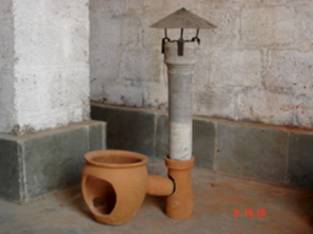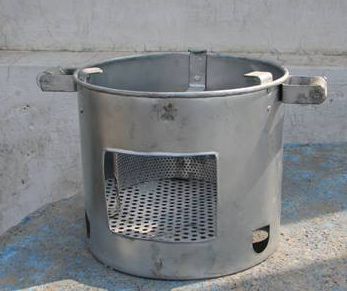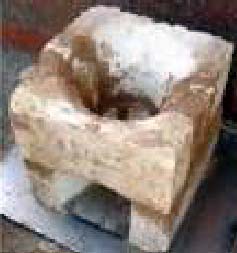A Mass Rural Livelihood Approach
In our given scenario, a majority of the rural customers are deprived of modern technology and solutions to their basic needs of light and energy. Causes are, non availability of targeted solutions; absence of reach mechanism and the lack of a suitable and viable systematic approach. Villages in India are hardly connected. Almost all operators see rural reach as a loss-making proposition.
TARAhaat joined hands with Shell Foundation under the Shell Breathing Spaces Program, to develop a commercial viable distribution strategy, which will become a worldwide model for rapid and sustainable replication of low smoke-emitting, energy efficient and effective cook stoves. Shell Foundation is providing the initial funding to support the creation of the infrastructure and scale up of the network for achieving commercial viability.

Our learning on distribution has given us clear cut understanding of the TARA Marketing Associate (TMA) model to reach targeted number of households. We are working through a model where Distribution Services will appoint and train Rural Unemployed Youth as TMAs on a 100% commission based programme. Once these TMAs are well equipped with product training and selling techniques they will move to their respective cluster of 20 villages to sell cook stoves designed by Development Alternatives. The prime objective of reaching one million households will be achieved through this strategy only. To achieve the said target TARAhaat will open 52 districts.
Till August 06, DA and TARAhaat have tested a couple of cook stoves both with and without chimney. Chimney Stove - Saral - Single Pot and made of Concrete, Pottery Liner Stove (PLS) both single pot (I) and twin pot (II), Without Chimney Stove - Improved Brick Stove (IBS), TARA 101D (mixed fuel i.e. dung cake 70% : wood 30%) & Ceramic Liner Stove (CLS). As per the Shell Foundation PLS I, II (known as Do It Yourself - DIY) and IBS (with 12 cm Diameter) meet their set standards on indoor air polution . Both the stoves i.e. PLS and IBS have some reservations because of which none of them can be put on scale up level.
From our experience of selling SARAL (Single Pot) cook stove made out of concrete material, which was a chimney stove, we experienced that customer likes the product, he/she perceives it value for money as it has various components like - it is made of concrete, chimney (two pieces of 6 feet each), cowl, rain protection sheet, grate and stopper. Once it gets installed the chimney is treated as symbol of status in the village. But because of certain practical ground realities this cook stove could not get success because -

- As it is made of concrete, it absorbs the heat and thereby increases the cooking time.
- Chimney takes out the smoke emitted during cooking but at the same hand lead time between ordering and procurement of these pipes is approximately 40 to 50 days depending upon the weather.
- Breakage loss while transporting these pipes at both the levels i.e.
- Time cost of TMA while installation is very high, he can't afford that as he is on 100% commission,
- To make the distribution business viable one needs to plan multiple dropping of cook stoves which is not possible in case of chimney stoves as on every drop one has to unload all the pipes and again load the balance, because one has to first load the base of the cook stove and before loading pipes you need to put lot of elephant grass to prevent breakage - this is time consuming and costly.
- Excessive weight of the cook stove is another major cause of non acceptability.
- Overall the supply chain is so cumbersome that it is demotivating.
First level i.e. from manufacturer's point to first level warehouse.
Second level i.e. from ware house to village level warehouse.
After that DA and TARAhaat developed PLS (I&II), IBS and TARA 101. Shell has sent their team to test these stoves against their parameters and except for TARA101; we succeeded in passing their set standards.
PLS (I&II) is again a chimney stove. Based on its experience of distributing chimney cook stove (saral). TARAhaat Distribution Team stoped the scaling of PLS (I&II). The learnings are :
- Non viable distribution proccess of chimney cook stove.
- Perception value of this cook stove doesn't go hand in hand with the MRP. So customer doesn't take it as value for money.
- The installation process takes 5 to 6 days to make this stove ready for use.
- Again TMA has to spend lot of time in installation.
- Since it is made of pottery so breakage while transportation is quite obvious and that erodes margins.
- As these pots are made of clay so during drying process there is shrinkage which varies with climatic conditions and it is very difficult to have any standardization in the dimensions which directly affects the performance.

TARA 101D - It is a metallic stove made of iron sheet and it is without a chimney. DA and TARAhaat are developing this cook stove as secondary stove for the customer. Presently DA is doing lab testing on this stove and yet to give green signal for scale up.
CLS - This stove is made of different clays. It is also a chimneyless stove. This is the stove which DA has approved for scale up and TARAhaat is going to proceed with this product from January 07 onward. Since this product has been designed and it is going to be positioned for BPL (below poverty line) segment, TARAhaat is expecting a good rate of penetration.
TARAhaat has developed detailed Product Market Index (PMI) and DA is working to develop Product Technical Index (PTI), The technology and marketing teams of DA and TARAhaat are working in close synergy to develop the proto type.
The sale of Improved Cook Stove (ICS) will require cutting edge marketing and awareness building. Half knowledge is always dangerous, so lack of overall awareness of the IAP (Indoor Air Pollution) issues and the ready and widespread availability of free unprocessed biomass based fuels, consumers have little or no incentive to spend on ICS products which cost a lot more than the traditional, polluting cook stoves. The Shell Breathing Spaces Programme requires financing strategies for a number of stakeholders. TARAhaat, as the manager of the programme, has to ensure that funding for its working capital requirements is met until the programme can look for self sustainability or market based financing.
Vipin Sharma
vsharma@tarahaat.com
vsharma@tarahaat.com